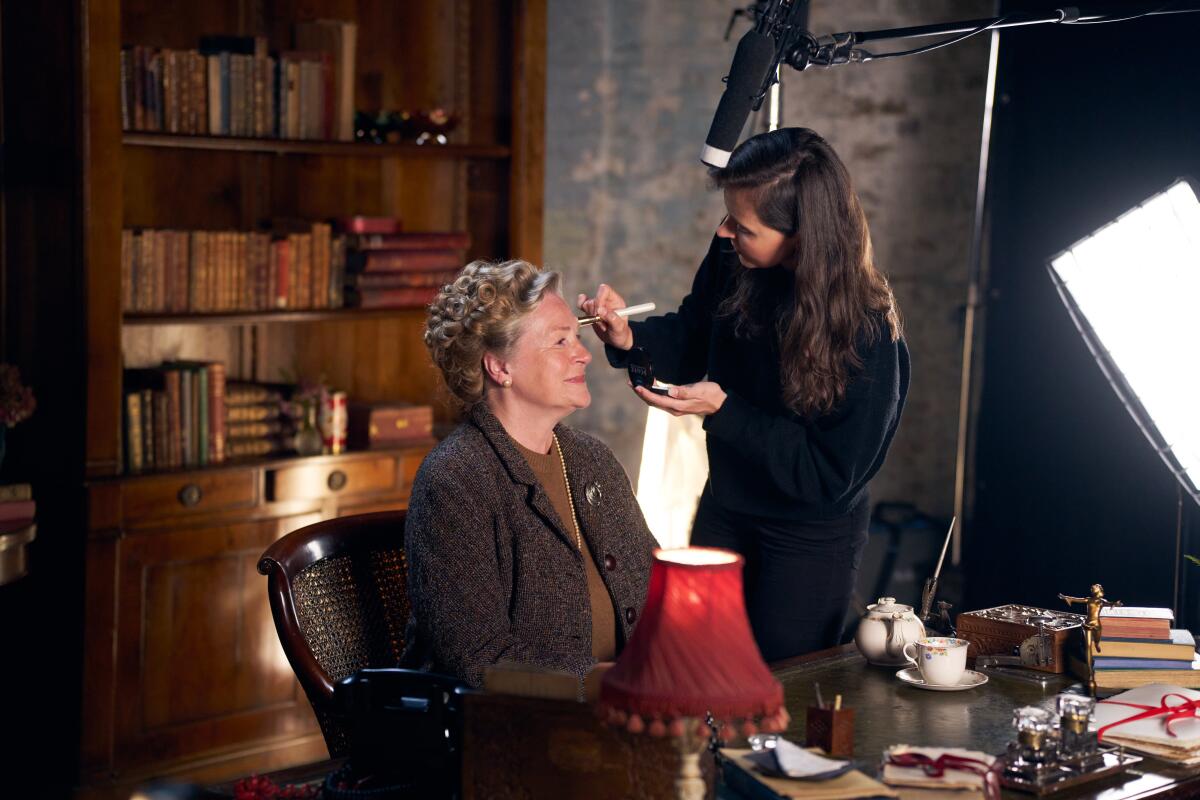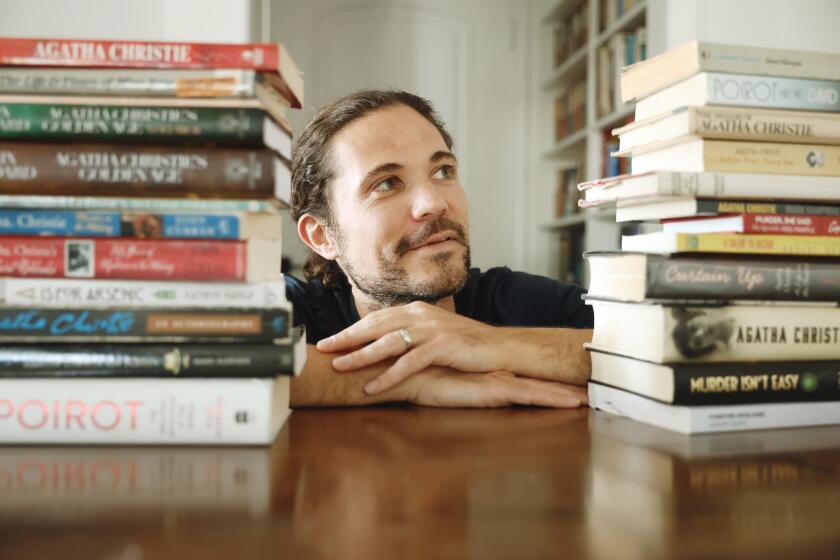An AI Agatha Christie? The bestselling novelist of all time deserves better than that

- Share via
There are very few recorded interviews with Dame Agatha Christie, the world’s bestselling novelist and generally acknowledged doyenne of crime, for one simple reason: She hated speaking in public.
She often described herself as cripplingly shy — she agonized for days when a celebration for the 10th anniversary of her play “The Mousetrap” required her to give a speech — and she remained morbidly press-adverse after the media swarm that followed her famous 11-day disappearance. (Though in defense of the press, what could one expect when a notable crime writer goes missing for almost two weeks in the midst of a shattering divorce and then, when found, refuses to explain what had happened?)
In her autobiography, and through her literary avatar Ariadne Oliver, Christie often described taking great pains to avoid speaking in front of people and she (and Mrs. Oliver) particularly hated being asked questions about her writing. “I never know what to say,” Mrs. Oliver would wail, echoing sentiments expressed by Christie herself.
So when BBC Maestro announced, at the end of April, that it was launching a digital class in which an AI-resurrected Christie would offer lessons in writing, it was difficult not to be outraged. Never mind the whole “I see dead people”-ness of it all; here was a woman who was on record, multiple times and often at great length, about how much she loathed having to talk about how she did what she did in front of a bunch of people.
The famed British mystery writer was a master of succinct storytelling. Her memoir, now rereleased, tells of a life much larger even than her considerable literary output.
The creators of the series clearly anticipated such outrage. The prologue to the course features BBC Maestro Chief Executive Michael Levine and Christie’s great-grandson James Prichard, chairman and CEO of Agatha Christie Ltd., explaining the care put into the series. The script, we are assured, is rigorously based on Christie’s own words; the actor (Vivien Keene) was chosen after a year-and-a-half search; and the set (a library that houses a model of Christie’s own typewriter), the costume (a tweed suit accented by pearls, a brooch and duplicates of Christie’s engagement and wedding rings) and the hair are models of authenticity.
More important, the course has the family’s full support. “At the heart of this project was my father who knew Agatha Christie better than any person living,” Prichard says. “At times he was astounded by how similar to his grandmother this version was. And my view,” he adds with a mildly challenging air, “is that if he can enjoy this project, we can all enjoy it.”

Challenge accepted.
Keeping in mind Christie’s fascination with disguise and advanced technology, as well as a passage in her autobiography in which she wishes a friend with more confidence could step in as a substitute during author interviews, I put my fears aside and ponied up $89 for the two-and-a-half-hour class.
Which is so respectful I found myself, at more than a few points in the 12 sections, wanting to scream.
We meet Keene’s Christie behind a desk, and there she stays, smiling and nodding as she walks us through her thoughts on her craft (including, in the introduction, her aversion to offering them).
For six years, thousands of Agatha Christie enthusiasts across the globe have downloaded the podcast for what one listener described as a ‘joyfully geeky’ take on the Queen of Crime’s expansive canon.
Christie’s autobiography is a doorstop. Thoughts about writing, her characters and her career run through it, but they rarely take up more than two consecutive pages. Christie historian Mark Aldridge has done a remarkable job of mining it, as well as other writings, to create a genuine tutorial with an admirable script.
Yes, Christie offers the typical anodyne advice — write what you know and the type of book you enjoy reading — but she also gets very granular. A murder mystery is best at 50,000 words, the murderer and important clues must be introduced very early on, settings should be described thoroughly but economically (“sometimes a map works best”) and one must never give into an editor who spells cocoa as “coco.”
In portions that include “characters,” “plots,” “settings” and “clues,” Christie assesses some of her work. She came to think that her first book, “The Mysterious Affair at Styles,” was over-stuffed with plot, but remained irritated by those who claimed that the twist in “The Murder of Roger Ackroyd” was a cheat. She wished she had introduced Hercule Poirot as a younger man, and was very happy to ditch Hastings for a while.
She discusses the importance of observation in everyday life, describing, among other things, how an encounter in front of a shop window led to one of her Parker Pyne stories, as well as the usefulness of isolated settings (“snow can also weigh down telephone wires”) and second (or third) murders.
In the opening minutes, it’s kind of neat to see what looks very much like a midlife Christie, smiling and talking in her very British way (the voice is not precise but close enough).
With the release of ‘A Haunting in Venice,’ two Christie obsessives weigh in on the enduring appeal of an author who’s been outsold only by the Bible and Shakespeare.
Still, there is no getting away from the fact that this is a two-and-a-half-hour lecture, delivered by a woman sitting behind a desk who, with the exception of a very few hand gestures, never moves. The camera moves, shooting her from this angle and that, and occasionally roving over various covers of Christie’s books. But Christie’s body remains as still as the late Queen Elizabeth II delivering her Christmas address.
I began to feel quite concerned for Keene — just how long were these takes? She delivers a vocally expressive performance and gives the digitally recreated face the necessary intelligence, wit and kindliness. The face itself looked fine — a bit glowy at times and immobile around the eyes — but its novelty quickly wore off. I would have happily traded what is essentially a parlor trick for a Christie who would get up and walk around a bit. Have a cup of tea, flip through a notebook.

I realize that it is a course, and one I did not have to go through in one sitting. But as the first hour slid into the second, I found myself longing for someone, Aldridge perhaps, to mine Christie’s exquisite autobiography more broadly and create an entire one-woman play. An evening with Agatha, free of AI, in which Christie could reminisce about her extraordinary life, from her glorious Victorian childhood to her later years as an archaeologist.
Though known as the creator of the manor-house murder story, Christie was, as her books indicate, a voracious world traveler, learning how to surf before surfing was a thing, and dealing with adventures and misadventures (including a 14-hour honeymoon trek by camel and a hideous case of bed bugs on the Orient Express) that would give even the most intrepid travel influencer pause.
Hercule Poirot had to rely on his “little grey cells” to find the killers in Agatha Christie’s novels, but the rest of us sometimes need some help.
She lived through two world wars, experienced wildly unexpected success and deep personal loss. She endured a heartbreaking divorce and a nervous breakdown, while raising a daughter and writing books, only to rally again and find love again in the most unexpected place.
She wasn’t a saint — her work occasionally includes the racist, antisemitic and classist tropes of its time — but she avowed fascism as often as her more political contemporaries and believed, as she says in the course, that she lived in contract with her readers for whom she had the utmost respect.
She was a celebrity who never behaved as a celebrity, an artist who never admitted to art (and wrote her books on any steady surface, including orange crates and washstands), a novelist like no other who also wrote the longest-running play in history and whose work continues to sell while being adapted in film and television. Her contribution to the culture is literally incalculable.
So surely she deserves more than a course that makes news mainly because of its use of dreaded AI. She’s Agatha-freaking-Christie. Give her a movie, a miniseries, a play. Give her an actor who worries less about the face and more about the words, and the life that inspired them.
More to Read
The biggest entertainment stories
Get our big stories about Hollywood, film, television, music, arts, culture and more right in your inbox as soon as they publish.
You may occasionally receive promotional content from the Los Angeles Times.













